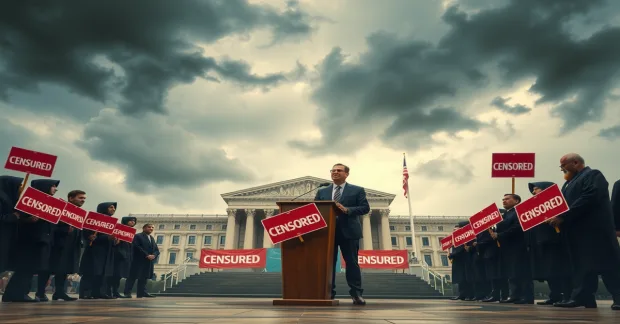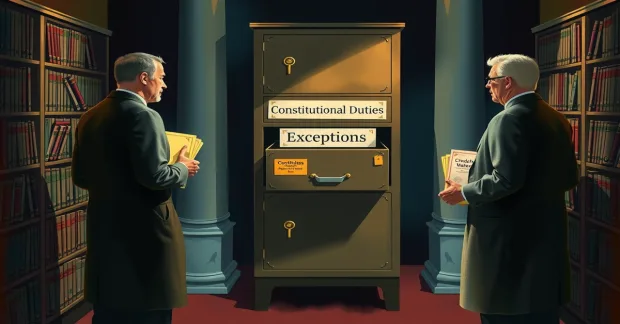
As you consider your rights, you may think that staying silent is a foolproof way to protect yourself, but what if your silence could be used against you? You need to understand that invoking your Fifth Amendment right isn’t as simple as just staying quiet, and not knowing the loophole could cost you your freedom. Can you afford to remain uninformed about the potential consequences of your silence, or will you take the necessary steps to protect yourself?
Key Takeaways:
- Are you aware that your silence can be used against you in a court of law, even if you think you’re protected by the Fifth Amendment? What if staying silent could actually hurt you, rather than help you?
- Do you know that the Fifth Amendment loophole allows prosecutors to interpret your silence as evidence of guilt, unless you explicitly invoke your right to remain silent? What would happen if you didn’t say the “magic words” to protect yourself?
- Can you imagine being in a situation where you’re not under arrest, but the police are “just talking” to you, and your silence could be used against you later? What if you’re at a traffic stop or casually answering questions on your front porch, and you don’t realize your rights are at risk?
- Have you considered the psychology behind the trap, where police officers are trained to exploit uncertainty and turn your silence into a story of guilt? What if your hesitation, nervousness, or failure to invoke your rights could be used against you in court?
- Are you prepared to affirmatively invoke your right to remain silent, by saying the “magic words” out loud and clearly: “I am invoking my right to remain silent and I want to speak to my attorney”? What if you don’t say it that way, and you end up walking into a constitutional gray zone?
- Do you think it’s fair that your right to silence only exists if you speak first, and that the system often protects those who understand the loopholes, rather than those who believe in fairness? What if you lost your freedom because you didn’t use the exact words lawyers use in courtrooms?
- Will you take the necessary steps to protect yourself, by understanding how your rights really work, and being prepared to invoke them when necessary? What if the next time an officer says, “You have the right to remain silent,” you ask yourself: Do you really, or have the rules changed so much that silence itself has become your worst mistake?
Understanding the Fifth Amendment
As you examine deeper into the complexities of the Fifth Amendment, you’ll discover that your right to remain silent is not as absolute as you thought. In fact, there are specific conditions under which your silence can be used against you, and it’s crucial to understand these nuances to protect your rights.
Historical Context and Origins
The Fifth Amendment has its roots in English common law, and its purpose is to protect individuals from self-incrimination. However, over time, court rulings have shaped the interpretation of this amendment, leading to the loophole that allows silence to be used as evidence of guilt.
Core Provisions of the Fifth Amendment
The core provision of the Fifth Amendment states that you have the right to remain silent, and anything you say can be used against you in a court of law. However, this provision is not as straightforward as it seems, and there are specific requirements you must meet to invoke your right to remain silent effectively.
For instance, the Supreme Court’s ruling in Salinas v. Texas (2013) established that your silence can be used as evidence of guilt unless you explicitly invoke your Fifth Amendment right. This means that simply remaining silent is not enough; you must affirmatively invoke your right to remain silent to protect yourself. This subtle distinction can have significant consequences, and it’s crucial to understand the implications of this ruling to avoid unintentionally waiving your rights.
Common Misconceptions
Many people believe that the Fifth Amendment guarantees an absolute right to remain silent, but this is a common misconception. In reality, the Fifth Amendment only protects you if you explicitly invoke your right to remain silent, and even then, there are exceptions and nuances that can affect the outcome.
For example, if you’re not under arrest, but the police are “just asking questions,” you may not be aware that your silence can still be used against you. This highlights the importance of understanding the specifics of the Fifth Amendment and how it applies in different situations. By being informed, you can avoid falling into the trap of unintentionally waiving your rights and ensure that you’re protected throughout the process.
The Right to Remain Silent

As you navigate the complexities of your rights, you must understand that your silence can be a double-edged sword – it can protect you, but it can also be used against you, and you need to be aware of the risks.
Definition and Legal Implications
Your right to remain silent is enshrined in the Fifth Amendment, but it’s not absolute, and you need to explicitly invoke it to protect yourself, otherwise, your silence can be interpreted as evidence of guilt.
Key Supreme Court Cases
Cases like Salinas v. Texas (2013) and Berghuis v. Thompkins (2010) have redefined how your right to remain silent works, and you need to understand the implications of these rulings to avoid unintentionally waiving your rights.
For instance, in Salinas v. Texas, the Supreme Court ruled that your silence can be used as evidence of guilt if you don’t explicitly invoke your Fifth Amendment right, which means that you need to be proactive in protecting your rights. This ruling has significant implications for individuals who are being questioned by the police, as it highlights the importance of clearly invoking your right to remain silent to avoid any potential consequences.
Miranda Rights Explained
When you’re read your Miranda rights, you’re being informed of your right to remain silent, but you need to understand what this means in practice, and how you can protect yourself by explicitly invoking your right to remain silent and requesting an attorney.
It’s important to note that your Miranda rights are not just a formality, but a critical protection that can help you avoid unintentionally incriminating yourself. By understanding your Miranda rights and how to invoke them effectively, you can ensure that you’re protected throughout the questioning process, and you can avoid making statements that could be used against you. This knowledge is power, and it’s crucial that you exercise your rights to remain silent and request an attorney to ensure that your rights are protected.
Limitations on the Right to Silence
As you navigate the complexities of the Fifth Amendment, you’ll discover that your right to silence is not absolute. In fact, there are specific situations where your silence can be used against you, and it’s imperative to understand these limitations to protect your rights.
Exceptions to the Fifth Amendment Protection
You should be aware that there are exceptions to the Fifth Amendment protection, which can leave you vulnerable if you’re not careful. For instance, if you’re not in custody, your silence can be used as evidence against you, highlighting the importance of explicitly invoking your right to remain silent.
The Public Safety Exception
The public safety exception is a significant loophole that allows police to interrogate you without reading your Miranda rights if they believe there’s an imminent threat to public safety. This exception can be misused to coerce you into speaking, making it crucial to understand your rights in such situations.
When the public safety exception is invoked, police can ask you questions without warning you of your rights, and your responses can be used as evidence against you. This exception has been expanded over the years, making it more challenging for you to protect your rights. For example, in the case of New York v. Quarles (1984), the Supreme Court ruled that the public safety exception applies when police believe there’s an imminent threat to public safety, even if it’s not a life-or-death situation. This ruling has been criticized for giving police too much discretion, making it imperative for you to be aware of your rights and to explicitly invoke them when necessary.
The Use of Silence in Court
Your silence can be used against you in court, especially if you haven’t explicitly invoked your Fifth Amendment right. Prosecutors can argue that your silence implies guilt, which can be damaging to your case. It’s imperative to understand how your silence can be used against you and to take steps to protect your rights, such as seeking the advice of a qualified attorney.
When you’re in court, your silence can be misinterpreted as a sign of guilt, even if you’re simply exercising your right to remain silent. This is why it’s crucial to have a clear understanding of your rights and to work with an attorney who can help you navigate the complexities of the legal system. By being aware of the potential pitfalls and taking steps to protect your rights, you can ensure that your silence is not used against you and that you receive a fair trial. Ask yourself: What if your silence in court is misinterpreted as a sign of guilt? How can you protect your rights and ensure that your silence is not used against you? The answer lies in understanding the intricacies of the Fifth Amendment and working with a qualified attorney who can help you navigate the legal system.
Waiving Your Rights: The Police Tactics
As you navigate the complex web of your rights, you must be aware of the tactics police use to encourage incrimination, making it vital to understand the nuances of waiving your rights to remain silent.
How Police Encourage Incrimination
Police officers are trained to create an environment where you feel comfortable sharing information, which can ultimately lead to your incrimination, so it’s crucial to be cautious and aware of your surroundings.
Psychological Manipulation Techniques
Police use various psychological manipulation techniques, including building rapport and trust, to extract information from you, making it vital to be mindful of your words and actions during interactions with law enforcement.
These techniques can be incredibly effective, as they often involve subtle suggestions and emotional appeals that can make you feel more comfortable sharing information, which can then be used against you in a court of law, highlighting the importance of being aware of these tactics and knowing how to protect yourself.
The Casual Conversation Trap
One of the most common tactics used by police is the casual conversation trap, where they engage you in a seemingly innocuous conversation, making you feel at ease, and then use your words against you, so it’s vital to be vigilant and aware of the potential consequences of your words.
This trap can be particularly dangerous, as it often involves friendly and approachable officers who use their charm to extract information from you, making it crucial to maintain a level of caution and skepticism during interactions with law enforcement, even if they seem friendly or casual, and to always prioritize protecting your rights.
Encountering Law Enforcement: What Happens When You Invoke the Fifth

When you’re faced with law enforcement, it’s necessary to understand the implications of invoking your Fifth Amendment right. You must be aware that simply staying silent is not enough to protect you, and that your silence can be used against you if you don’t explicitly invoke your right.
The Proper Way to Invoke Your Rights
To invoke your Fifth Amendment right, you must clearly and confidently state, “I am invoking my right to remain silent and I want to speak to my attorney.” This explicit invocation is necessary to protect yourself from potential self-incrimination.
The Legal Consequences of Invocation
If you invoke your Fifth Amendment right, you may still face legal consequences, such as being held in contempt of court or being perceived as guilty by the prosecution. However, invoking your right can also protect you from making self-incriminating statements.
It’s worth noting that the legal consequences of invocation can be severe, and you may face additional charges or penalties if you’re found to have waived your right to remain silent. For example, in the case of Salinas v. Texas (2013), the Supreme Court ruled that a defendant’s silence can be used as evidence of guilt if they don’t explicitly invoke their Fifth Amendment right. This highlights the importance of understanding your rights and invoking them correctly to avoid potential legal pitfalls.
Court Cases Impacting Invocation Rights
Court cases such as Berghuis v. Thompkins (2010) have significantly impacted the way invocation rights are interpreted, emphasizing the need for explicit invocation to protect oneself from self-incrimination. These cases have set a precedent for the importance of clearly invoking one’s Fifth Amendment right to avoid potential legal consequences.
For instance, in Berghuis v. Thompkins (2010), the Supreme Court ruled that a defendant’s silence during a police interrogation can be used as evidence of guilt if they don’t explicitly invoke their Fifth Amendment right. This case highlights the importance of understanding your rights and invoking them correctly to avoid potential legal pitfalls. By being aware of these court cases and their implications, you can better protect yourself when encountering law enforcement and invoking your Fifth Amendment right.
Body Language and Non-Verbal Communication
As you navigate interactions with law enforcement, it’s necessary to consider how your body language and non-verbal cues can be perceived, as they can potentially be used against you, highlighting the importance of being mindful of your every move and expression.
How Silence Can Be Misinterpreted
Your silence can be misinterpreted as a sign of guilt or nervousness, so it’s crucial to be aware of your surroundings and the potential implications of your actions, or rather, your lack of action, which can significantly impact the outcome of your interaction with the police.
Non-Verbal Cues and Their Legal Implications
Non-verbal cues, such as avoiding eye contact or fidgeting, can be used as evidence against you, emphasizing the need to understand the legal implications of your non-verbal communication and to be cautious when interacting with law enforcement, as even the most innocent actions can be twisted to imply guilt.
For instance, in the case of Salinas v. Texas (2013), the Supreme Court ruled that a defendant’s silence can be used as evidence of guilt if it is not explicitly protected by the Fifth Amendment, highlighting the importance of clearly invoking your right to remain silent to avoid any potential misinterpretation of your non-verbal cues, and to ensure that your silence is not used against you in a court of law.
The “Consciousness of Guilt” Doctrine
The “consciousness of guilt” doctrine allows prosecutors to use a defendant’s behavior, including their non-verbal cues, as evidence of guilt, making it necessary to be aware of this doctrine and its implications when interacting with law enforcement, and to understand how your actions, or lack thereof, can be used against you in a court of law.
For example, if you refuse to answer questions or avoid eye contact during an interaction with the police, it can be argued that you are demonstrating a “consciousness of guilt,” which can be used as evidence against you, emphasizing the need to clearly invoke your right to remain silent and to seek legal counsel to protect your rights and avoid any potential misinterpretation of your actions.
The Role of Technology in Modern Interrogations
As you navigate the complex landscape of your rights, you must consider how technology is changing the game – your every move is being watched and recorded, and this evidence can be used against you in a court of law, making it even more critical to understand the Fifth Amendment loophole.
Surveillance and Its Effect on Privacy
Surveillance cameras and devices are everywhere, and their presence can significantly impact your right to privacy, making it important to be aware of your surroundings and know how to protect yourself when interacting with law enforcement.
Digital Communication and Self-Incrimination
Your digital footprint can be a treacherous path to self-incrimination, as anything you say or do online can be used as evidence against you, highlighting the need to be extremely cautious with your online activities and to understand how they can impact your rights.
For instance, if you’re being questioned by the police and you’ve previously discussed the incident on social media or via text messages, those digital communications can be used to build a case against you, even if you invoke your right to remain silent – your digital history can speak louder than your silence, making it crucial to be mindful of your online presence and to take steps to protect yourself from potential self-incrimination.
Body Cameras and Their Legal Ramifications
The increasing use of body cameras by law enforcement officers has significant legal ramifications, as the footage can be used as evidence in court, and you need to understand your rights when it comes to being recorded by these devices, including knowing when and how the footage can be used against you.
For example, if you’re involved in an incident and the officer’s body camera captures the event, that footage can be used to support or contradict your account of what happened, making it important to be aware of the camera’s presence and to know how to navigate the situation to protect your rights – your knowledge of the law and your rights can be your best defense in such situations, and ignorance of the law can lead to devastating consequences, so it’s crucial to be informed and prepared.
The Evolution of Miranda Rights

As you explore deeper into the complexities of the Fifth Amendment, you’ll discover that the concept of Miranda rights has undergone significant transformations over the years, with landmark cases like Salinas v. Texas and Berghuis v. Thompkins redefining the boundaries of your right to remain silent.
Changes to Legal Standards Over Time
You’ll find that the legal landscape surrounding Miranda rights has shifted dramatically, with courts increasingly interpreting silence as potential evidence of guilt, unless you explicitly invoke your Fifth Amendment right, highlighting the importance of understanding these changes to protect your rights.
The Impact of New Legislation
New legislation and court rulings have profoundly impacted the way your right to remain silent is perceived, making it important for you to stay informed about these developments to avoid unintentionally waiving your rights, and to understand how these changes can be used against you in a court of law.
For instance, the Supreme Court’s decision in Salinas v. Texas (2013) established that your silence can be used as evidence of guilt, unless you explicitly invoke your Fifth Amendment right, which means that you must be aware of your rights and assert them clearly to avoid any potential misinterpretation, and to ensure that your silence is not used against you, you must understand the specific circumstances under which your right to remain silent applies, and be prepared to invoke it explicitly and confidently.
Current Debates Surrounding Miranda Rights
Currently, there are ongoing debates about the effectiveness and fairness of Miranda rights, with some arguing that the system is stacked against those who are unaware of the loopholes and complexities, while others believe that the rights are important for protecting the innocent, and as you navigate these complexities, you’ll need to consider the potential consequences of staying silent, and the importance of asserting your rights clearly to avoid any potential pitfalls.
As you consider these debates, you’ll need to ask yourself: what are the implications of a system where silence can be used as evidence of guilt, and how can you protect yourself from unintentionally waiving your rights, and to do so, you’ll need to stay informed about the latest developments and court rulings, and be prepared to assert your rights confidently to ensure that your silence is not used against you, and that you receive the fair treatment you deserve under the law.
Case Studies: Silence Leading to Conviction
As you investigate into the specifics of the Fifth Amendment loophole, you’ll find numerous cases where silence was used as evidence against the defendant, such as Salinas v. Texas and Berghuis v. Thompkins, which highlight the importance of explicitly invoking your right to remain silent.
- Salinas v. Texas (2013): The Supreme Court ruled that a defendant’s silence can be used as evidence of guilt if they don’t explicitly invoke their Fifth Amendment right.
- Berghuis v. Thompkins (2010): The Court decided that a defendant must clearly invoke their right to remain silent, otherwise, their silence can be used against them.
Notable Cases and Their Outcomes
You’ll notice that in many cases, the defendant’s failure to explicitly invoke their right to remain silent led to their conviction, emphasizing the need for you to understand the intricacies of the Fifth Amendment loophole.
The Impact of Public Perception
The general public’s misconception about the absolute nature of the right to remain silent can lead to a false sense of security, making it necessary for you to be aware of the potential consequences of staying silent without invoking your rights.
Furthermore, the fact that silence can be used as evidence against you can significantly impact public perception, as it may seem counterintuitive that staying silent could be used to incriminate you, highlighting the need for you to be informed about your rights and how to protect them.
Lessons Learned from Real-Life Scenarios
By examining real-life cases where the Fifth Amendment loophole was used, you can gain valuable insights into the importance of explicitly invoking your right to remain silent, and how failing to do so can have severe consequences, emphasizing the need for you to be proactive in protecting your rights.
Additionally, these cases demonstrate that understanding the complexities of the Fifth Amendment loophole is critical in ensuring that your rights are protected, and that you are not inadvertently incriminating yourself by staying silent without invoking your rights, making it necessary for you to be informed and prepared to navigate these situations.
Protections and the Need for Vigilance
As you navigate the complexities of the Fifth Amendment, it’s important to understand that your rights are not absolute, and remaining silent can be a double-edged sword. You must be aware of the potential consequences of your silence and take steps to protect yourself.
Recognizing Police Interrogation Techniques
Police officers are trained to exploit uncertainty, and your silence can be used against you if you don’t explicitly invoke your Fifth Amendment right. Be cautious of “friendly” conversations that may seem harmless but can ultimately be used as evidence.
Legal Rights Checklist for Citizens
To ensure your rights are protected, know what to say and do when interacting with law enforcement. Familiarize yourself with the “magic words” that can safeguard your silence: “I am invoking my right to remain silent and I want to speak to my attorney.”
As far as your legal rights checklist, it’s crucial to understand that simply remaining silent is not enough. You must affirmatively invoke your right to remain silent, and it’s recommended that you do so in a clear and confident manner. This means saying the “magic words” out loud, without hesitation or ambiguity. By doing so, you can avoid walking into a constitutional gray zone where your silence can be twisted into guilt. Additionally, being aware of the specific circumstances under which your right to remain silent may not apply, such as during non-custodial interactions or civil cases, can help you make informed decisions about how to protect yourself.
Importance of Legal Representation
Having a lawyer by your side can be the difference between protecting your rights and unintentionally waiving them. Don’t rely on TV lawyers or cop shows to teach you real law – seek professional guidance to understand how your rights really work.
In the context of the Fifth Amendment loophole, legal representation is more important than ever. A skilled attorney can help you navigate the complexities of the law and ensure that your rights are protected. They can also provide guidance on how to invoke your right to remain silent effectively and avoid potential pitfalls. By seeking legal representation, you can level the playing field and ensure that you’re not taken advantage of by law enforcement or prosecutors who may try to exploit the loopholes in the system. Be mindful of, knowledge is power, and having a lawyer who understands the intricacies of the Fifth Amendment can be your best defense against the potential consequences of silence.
The Impact of Social Media on the Right to Silence
As you navigate the complexities of the Fifth Amendment, consider how your online presence can be used against you, with social media posts and digital footprints potentially serving as evidence in court, making it important for you to understand the implications of your online activities on your right to remain silent.
Implications of Digital Footprints
Your digital footprint can be a treacherous terrain, as anything you post or share online can be used to build a case against you, highlighting the need for you to be cautious about what you share online and to recognize the potential consequences of your digital actions.
How Online Statements Can Be Used in Court
Be aware that your online statements can be subpoenaed and used as evidence in court, which is why it’s crucial for you to think carefully before posting anything online, as it may come back to haunt you in the form of a conviction or a lengthy sentence.
For instance, if you post about a crime or an incident on social media, those statements can be used to establish your involvement or guilt, even if you later invoke your right to remain silent, making it important for you to exercise extreme caution when sharing information online, and to consider the potential consequences of your words, as they can be used to build a narrative of guilt that can be difficult to refute in court.
The Blurring Lines of Privacy
The rise of social media has led to a blurring of the lines between public and private spaces, making it easier for law enforcement to gather evidence and build cases against individuals, which is why you need to be aware of your online privacy settings and to take steps to protect your personal information from being used against you.
As you consider the implications of social media on your right to silence, ask yourself: What if your online activities are being monitored and used as evidence against you? What if your digital footprint is being used to establish your guilt or involvement in a crime? By understanding the potential risks and consequences of your online activities, you can take steps to protect yourself and to ensure that your right to remain silent is not compromised by your digital presence, and that you are not inadvertently waiving your rights through your online actions.
Advocacy and Reform Efforts

As you probe deeper into the complexities of the Fifth Amendment loophole, you’ll find that various organizations and reformers are working tirelessly to raise awareness and push for legislative changes that protect your right to remain silent. You may be surprised to learn that some of these efforts have already led to significant advancements in safeguarding individual rights.
Organizations Working on Fifth Amendment Issues
Several organizations, such as the American Civil Liberties Union (ACLU) and the National Association of Criminal Defense Lawyers (NACDL), are dedicated to addressing the Fifth Amendment loophole and its implications on your rights. You can explore their resources and initiatives to better understand the issue and how you can get involved.
Legislative Changes Advocated by Reformers
Reformers are advocating for legislative changes that would require law enforcement to explicitly inform you of your right to remain silent and the potential consequences of not invoking it. You should be aware that some proposed bills aim to strengthen the protections afforded by the Fifth Amendment, ensuring that your silence is not used against you.
For instance, you may be interested to know that some lawmakers have proposed legislation that would mandate law enforcement to provide clear and concise explanations of the Fifth Amendment right, including the risks of not invoking it. This could potentially lead to a significant shift in how your right to remain silent is protected. You can stay informed about these developments and consider reaching out to your representatives to express your support for such reforms.
Public Awareness Campaigns
Public awareness campaigns are also playing a crucial role in educating you about the Fifth Amendment loophole and its potential consequences. You can participate in these efforts by sharing information with your friends and family, and by supporting organizations that work to protect individual rights.
As you consider the impact of the Fifth Amendment loophole on your life, you may want to ask yourself: What if you could make a difference in the lives of others by spreading awareness about this issue? What if your actions could contribute to a broader movement that protects the rights of all individuals? By staying informed and engaged, you can help create a more just and equitable society, where your right to remain silent is truly protected. You should also be aware that some public awareness campaigns are using social media and other platforms to reach a wider audience, making it easier for you to get involved and make your voice heard.
Preparing for Interactions with Law Enforcement
As you prepare for potential interactions with law enforcement, it’s imperative to understand your rights and how to protect them. You must be aware of the Fifth Amendment loophole and know how to invoke your right to remain silent effectively.
Tips for Safeguarding Your Rights
To safeguard your rights, you should:
- Know your Miranda rights
- Understand the importance of explicitly invoking your right to remain silent
- Be aware of the potential consequences of staying silent without invoking your right
Assume that your silence can be used against you if you don’t invoke your right to remain silent.
Strategies for Remaining Silent Effectively
Remaining silent effectively requires a clear understanding of your rights and how to invoke them. You must be able to articulate your desire to remain silent and request an attorney.
For example, you can say, “I am invoking my right to remain silent and I want to speak to my attorney.” This statement clearly communicates your intention to remain silent and avoids any potential misinterpretation. By being explicit and direct, you can protect your rights and avoid unintended consequences.
When to Contact Legal Assistance
It’s crucial to know when to contact legal assistance to protect your rights. If you’re unsure about how to invoke your right to remain silent or if you’ve already been questioned by law enforcement, you should seek legal advice immediately.
For instance, if you’ve been arrested or detained, you should request an attorney as soon as possible. An experienced attorney can help you navigate the complex legal system and ensure that your rights are protected. By seeking legal assistance promptly, you can avoid potential pitfalls and ensure the best possible outcome for your case.
Final Words
With these considerations, you now understand the complexities of the Fifth Amendment loophole and how your silence can be used against you. You must be aware of your rights and explicitly invoke them to protect yourself. Will you be prepared to assert your rights when faced with a situation where your silence could be misconstrued as guilt, or will you unknowingly waive your protection? The choice is yours, and your freedom may depend on it.
FAQ
Q: What is the Fifth Amendment loophole that police don’t want me to know?
A: The Fifth Amendment loophole refers to the fact that under certain conditions, your silence can be used against you as evidence of guilt, unless you explicitly invoke your Fifth Amendment right. This means that if you don’t say the magic words, “I am invoking my right to remain silent and I want to speak to my attorney,” your silence can be interpreted as a sign of guilt, and prosecutors can use it against you in court.
Q: How does the Fifth Amendment loophole work in practice?
A: In practice, the loophole means that if you’re not under arrest, but the police are “just talking” to you, or if you’re at a traffic stop, or casually answering questions on your front porch, your silence can be used against you later. This is because in those “non-custodial” moments, you don’t technically have to be read your Miranda rights, and if you stay quiet without clearly invoking your right, your silence can be used as proof that you had something to hide.
Q: What are the “magic words” that can protect me from the Fifth Amendment loophole?
A: To protect yourself, you must affirmatively invoke your right by saying the magic words: “I am invoking my right to remain silent and I want to speak to my attorney.” If you don’t say it that way, you could be walking straight into a constitutional gray zone, where silence isn’t protected, and everything you didn’t say can be twisted into guilt.
Q: Can I still get in trouble if I invoke my right to remain silent?
A: Invoking your right to remain silent is not a guarantee that you won’t get in trouble, but it’s a crucial step in protecting yourself from the Fifth Amendment loophole. If you invoke your right, the police and prosecutors cannot use your silence against you as evidence of guilt. However, they may still try to use other evidence or tactics to build a case against you.
Q: How can I avoid falling into the trap of the Fifth Amendment loophole?
A: To avoid falling into the trap, you need to understand how your rights really work, and be prepared to invoke them if necessary. This means knowing the magic words, and being confident and clear when you say them. It’s also important to be aware of your surroundings and the situation, and to know when you’re in a position where your silence could be used against you.
Q: What are the consequences of not understanding the Fifth Amendment loophole?
A: The consequences of not understanding the Fifth Amendment loophole can be severe. If you don’t invoke your right to remain silent, your silence can be used against you as evidence of guilt, and you could be convicted of a crime you didn’t commit. This is why it’s so important to understand your rights, and to be prepared to protect yourself if necessary.
Q: How can I protect myself from the Fifth Amendment loophole in everyday situations?
A: To protect yourself from the Fifth Amendment loophole in everyday situations, you need to be aware of your rights, and be prepared to invoke them if necessary. This means knowing the magic words, and being confident and clear when you say them. It’s also important to be cautious when interacting with police, and to know when you’re in a position where your silence could be used against you. By being informed and prepared, you can protect yourself from the Fifth Amendment loophole, and ensure that your rights are respected.



















